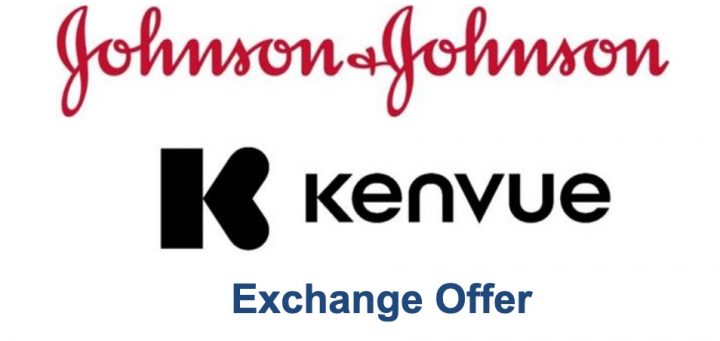Update 8/24: Here are the final results of this odd lot tender. See original post below for past details, although the opportunity has passed. Per JNJSeparation.com, the final exchange ratio was 1 share JNJ to 8.0324 shares of KVUE. The deal was oversubscribed, with a final proration factor of ~23.2% of shares tendered. However, those with “odd lots” of 99 shares or less were not subject to proration, which created an opportunity for smaller individual investors.
Here are the stats:
- 8/14 prices (closing), JNJ $173.44 and KVUE $22.94.
- 99 shares of JNJ @$173.44 = $17,171 (8/14)
- 8/24 prices (intraday), JNJ $165.36 and KVUE $23.32.
- 99 shares of JNJ tendered = 795.20 shares of KVUE.
- 795.20 shares of KVUE @$23.32 = $18,544 (8/24)
Net profit on 99 JNJ shares bought 8/14, tendered, and sold 8/24: ~$1,350. If you sold your resulting KVUE and immediately bought JNJ back again intraday on 8/24, you would end up with ~112 shares of JNJ.
For the curious, the current market caps are JNJ $430 billion and KVUE $44.5 billion. So if you wanted to keeping owning the “original” JNJ components in a weighted manner, that would be roughly 90% JNJ and %10 KVUE. (JNJ still owns about 9.5% of KVUE after this split-off.)
Original post 8/12:
Everyone knows Johnson & Johnson (JNJ), but fewer know that the huge company spun off its consumer health division (Tylenol, Band-Aid, etc) earlier in 2023 and called it Kenvue (KVUE). JNJ kept its pharmaceutical and medtech divisions, but also still owns about 90% of KVUE. Moving forward with the split-off, they are offering JNJ shareholders the option to tender roughly $100 of JNJ and get $107 of KVUE stock in return.
They are incentivizing JNJ shareholders to help them complete the split-off, and it’s a good deal, almost too good as it may be “oversubscribed” and tenders may be pro-rated. However, there is an “odd lot” provision in the deal, where if you only have 99 shares of less of JNJ and tender them all, you won’t be subject to pro-ration. This is a small corner where small individual investors can gain a small advantage that the bigger money can’t access.
Now, I’m not an expert on this stuff by any means, and there are risks involved. The following two articles and the official informational site explain the various details and risks in much better detail.
From the official site above that tracks the share prices for the exact tender ratio (upper limit not in effect at time of writing):
If the Exchange Offer is oversubscribed and Johnson & Johnson cannot accept all tenders of J&J Common Stock at the exchange ratio, then all shares of J&J Common Stock that are validly tendered will generally be accepted for exchange on a pro rata basis in proportion to the number of shares validly tendered, which is referred to as “proration.” Stockholders who beneficially own “odd-lots” (less than 100 shares) of J&J Common Stock and who validly tender all of their shares will not be subject to proration (other than participants who hold odd-lot shares as a participant in the Savings Plans).
To quickly summarize the potential deal:
- Buy 99 shares* of JNJ at your broker, for an approximate cost of $17,000.
- Tender *all* your shares through your broker . You can’t own 100+ shares and only tender 99. The deadline is supposed to be 8/18, but some brokers may require your tender instructions earlier than that. (At Fidelity it is 08/17 at 7pm ET.) I’d do it as soon as you can.
- If all goes smoothly (not guaranteed by me), then you’ll get ~$18,200 of KVUE approximately 7 business days after the deadline. You can sell the shares for cash if you want to realize a potential profit of ~$1,200. You may get a little less depending on the relative share prices of JNJ and KVUE.
- * You can buy less than 99 shares for less financial commitment (and less upside), but you have to tender them all.
This is the type of deal that I find both interesting and educational, on top of having a positive expected value. Warren Buffett today wouldn’t bother with this deal, but Warren Buffett age 14 might. This is more of a calculated gamble, rather than a fixed return. There is risk involved, including either the deal being canceled somehow (you keep 99 shares of JNJ) or the limit ratio being reached and you get less than 7.5% premium of KVUE. You should perform your own due diligence.


